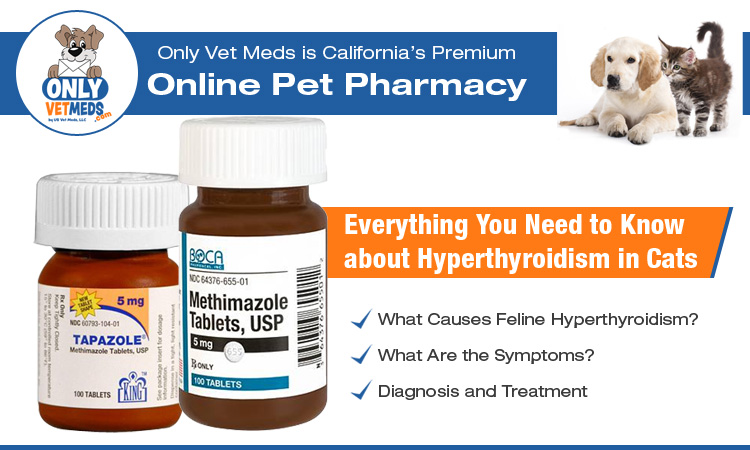

- Dog/Cat
Everything You Need to Know about Hyperthyroidism in Cats
Posted on 12/26/2018

Both dogs and cats are prone to thyroid gland issues. While hypothyroidism (lower thyroid hormones) is common among dogs, hyperthyroidism (excessive thyroid hormones) mainly affects the cats. The good news is that hyperthyroidism in cats can be treated with the help of pet medications.
What Causes Feline Hyperthyroidism?
Unfortunately, there are no known causes of this health condition in cats. The thyroid glands in cats get enlarged and start secreting the excess of T4 hormones. The experts in pet medication believe that the problem might be caused when certain dietary compounds lack or are given in excess to the cats. Other pet med experts are of the view that non-cancerous as well as malignant tumors may cause the issue.
What Are the Symptoms?
The common symptoms of hyperthyroidism in cats include weight loss, increase in appetite, frequent vomiting, diarrhea, increased thirst as well as urination, hyperactivity and unkempt coat. If you see any of these symptoms in your pet, immediately consult a veterinarian for pet meds.
Diagnosis and Treatment
Physical examinations and blood test are performed to diagnose the problem. An elevated T4 level in blood may indicate the issue. The treatment options for the condition include:
- Cat medications like Methimazole and Tapazole tablets.
- Radioactive iodine therapy performed using injections.
- Iodine management in diet.
- Surgical removal of thyroid glands.
If your cat's veterinarian has prescribed a pet med, you can conveniently buy it online with OnlyVetMeds. The pet pharmacy also deals in other cat medications for the issues like flea and ticks, heartworms, diabetes etc. and in dog medications as well.
Important Things to Know:
- Hyperthyroidism usually occurs in middle-age or senior cats (both males and females)
- 2-10% of hyperthyroid cats may show normal T4 level in blood test. So, other tests need to be performed.
- Hyperthyroidism in cats may also trigger other complications like heart diseases, kidney diseases, breathing issues and more.

 Flea and Tick
Flea and Tick Heartworm
Heartworm Skin & Coat
Skin & Coat Medications
Medications Rx Food
Rx Food Arthritis & Pain
Arthritis & Pain Vitamins & Supplements
Vitamins & Supplements Electrolytes
Electrolytes Wormers/Deworming
Wormers/Deworming Dental Care
Dental Care Flea and Tick
Flea and Tick Heartworm
Heartworm Skin & Coat
Skin & Coat Medications
Medications Rx Food
Rx Food Arthritis & Pain
Arthritis & Pain Vitamins & Supplements
Vitamins & Supplements Electrolytes
Electrolytes Wormers/Deworming
Wormers/Deworming Dental Care
Dental Care



